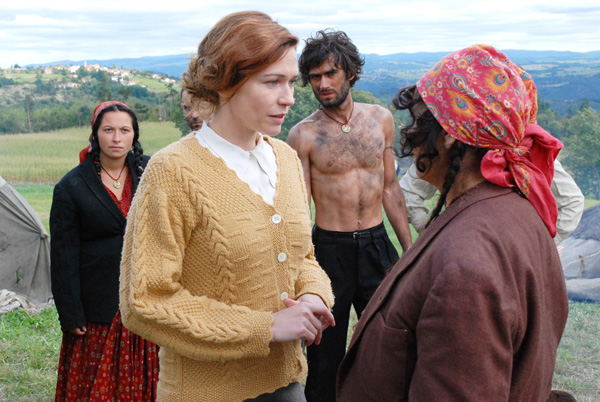|
Reviews of Recent Independent, Foreign, & Documentary Films in Theaters and DVD/Home Video

KORKORO Algerian-born French director Tony Gatlif has expressed his passionate affinity for the Roma people through a trilogy of contemporary looks at their musical, familial culture: Les princes (1983), Latcho Drom (1993), and Gadjo Dilo (1997). As the discrimination against Gypsies, as they are called in some countries, has continued throughout Europe today, he wanted Korkoro (“freedom” in Romani) to remind the world of their devastating Holocaust during World War II, when almost a quarter of the two million Roma then in Europe perished. In 1943 Vichy France, they are called Nomads. There, a caravan of an extended family reluctantly adopts out of pity a runaway French orphan, Claude (Mathias Laliberté), who longs for their food (and affection). They name him Chouroro—pauper. Setting up camp outside the village where they annually come to work as migrant farm labor, they realize that times have changed—German soldiers saunter across their usual travel routes and registration procedures have tightened at the local town hall. The pretty school teacher, Mademoiselle Lundi (Marie-Josée Croze), convinces the sympathetic mayor/veterinarian, Théodore Rosier (Marc Lavoine), to approve their stay, and in turn the family gives Chouroro into the mayor’s care and back into his own culture. The next town on the caravan’s route is not so welcoming, and the French police round them up into a crowded internment camp behind barbed wire patrolled by French guards. While there’s been a spate of features that also point at French complicity in turning over “foreigners” for transport to concentration camps in the east (Claude Miller’s A Secret (2008) and Robert Guédiguian’s The Army of Crime last year,), the mayor and the teacher initiate a gutsy rescue (inspired by a true story), and a bit of a romance. The mayor bravely persuades the authorities to release the Roma, and he gives them the deed to a home—now the challenge is if they can settle down amidst rising local and German animosity. In this charming interlude, Gatlif focuses on the culture clash, with the children only attending school for treats and the adults performing rituals to ward off ghosts in the cellar and playing music for chickens to lay eggs. But much attention is on the child-like adult Félix Taloche (the French actor James Thiérrée), who’s some kind of crazy. His antics go on a bit too long, until he’s seen as symbolically bearing his people’s innate free spirit. Thiérrée’s exuberant physical comedy wonderfully recalls his grandfather Charlie Chaplin, especially in a scene of him setting water free from faucets.
Holocaust documentaries usually only mention in passing that those
labeled Gypsies were treated worse than the Jews, and there were very
few survivors to provide eyewitness testimony on film. Gatlif, who also
co-wrote the lively score, intends this lovely film, as life-affirming
as it is sad, to be enlightening. Though not MPAA rated, it would be
considered at most PG-13, and deserves to be seen by a wide audience.
Nora Lee Mandel
|

